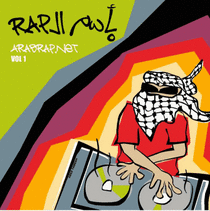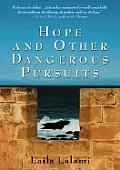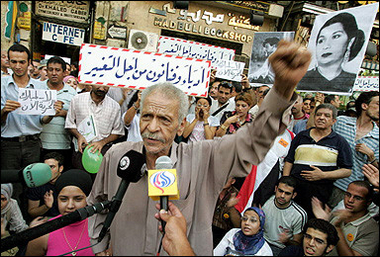El-Zahir
So Coelho didn't do his research. And neither did the Times. Shocking.
Author Randa Jarrar's Blog
 Sweet article about the Gaza rap group P.R.
Sweet article about the Gaza rap group P.R. Critical Palestinians speak of a "culture of death"; as long as their compatriots are being shot dead, wounded and held in jail, many people feel that there should be no public manifestation of joy. Now, large wedding parties are again taking place in the Gaza Strip; but although dance music is played, none of the seated guests even claps along to it. It's an attitude that links the generations: music and exuberance are targets of disapproval.
Hindered at home, the Palestinian Rappers were delighted by the chance to tour Northern Ireland in March. The tour was organised by a solidarity committee in the province, and it gave Muhammad the opportunity to leave the Gaza Strip for the first time in his life.
"And when we came back", he laughs, "the first thing that happened was we were summoned by the Palestinian intelligence agency. They wanted to know whether I knew any Americans and what I had been up to in Ireland."
A text that has been endlessly read and re- read, and one to be found on the bedside tables of both Proust and Borges, this book was a revelation for Bencheikh, since it signaled the revelation of another meaning to Arab culture and perhaps a truer one. Before the publication, in 1991, of the first edition of Bencheikh's joint translation of the Thousand and One Nights, which he completed with André Miquel, Bencheikh published various critical studies of the text in which he brought out what for him was essential to it: namely, its subversive character and its way of getting around the law. Thus, in his book Les Mille et une nuits, ou la parole prisonnière (The Thousand and One Nights, or Imprisoned Speech), which appeared in 1988, after having analysed the various mechanisms employed in the work Bencheikh concluded that "this anonymous work....preserves the echo of a speech that has become a prisoner, a speech that is buried still deeper than desire and that is even more subversive than love. At the centre of civilisation appears this strange memory of another age." In another work, this time produced in collaboration with Claude Brémond and André Miquel, entitled Les Mille et un contes de la nuit (The Thousand and One Tales of the Night) and appearing in 1991, Bencheikh analysed another aspect of the text: the connection between love and death.
Kimberly Joyce (Evan Rachel Wood), the high-school vamp and evil genius in the new satirical comedy “Pretty Persuasion,” tells her protégée, Randa (Adi Schnall), an Arab émigrée, that she, Kimberly, is glad she is white. Then she wonders what she would choose to be if she had to be something else. For Randa’s benefit, she lists the possibilities in her order of preference: first Asian, then African-American (as long as she could have “Caucasian features,” like Halle Berry), ending with Arab.The movie was penned by Skander Halim. Everything I've read about it is a mixture of warning and urging, which makes me want to see it.
Chillax (v)
Chill out and relax, hang out with friends.
Labradoodle (n)
A cross breed dog. Half poodle, half labrador.
Zlander (n)
Someone who talks badly about a person when they are sleeping.
RB: Your apocalyptic vision. We are trying to understand how to process your description of this major discontinuity that people view with various degrees of acceptance and incredulity. Again, I was talking about your book, and someone claimed that their boyfriend converts vegetable oil to fuel for their car. I said, “Didn’t it take some energy to get the vegetable oil to its current state?”
JHK: Let’s talk about this [alternative fuels] for a moment. I tell people that no combination of alternative fuels will allow us to continue running the interstate highways and Disney World and Wal-Mart—even a substantial fraction of what we are running in America—the way we are running it. And we will use them but probably at a much smaller scale than most people anticipate. I had a run-in with bio-diesel enthusiasts in Middlebury [Vt.], and they were incensed that I wasn’t as enthusiastic as they were about it. A lot of them were young. I tried to explore their thinking. And I asked, “Has it occurred to you that as our industrial methods of agriculture fade and fail that probably we’ll have to devote more crop land to the production of human food because our crop yields will go down when we stop pouring fertilizers and pesticides and natural gas-based products and oil-based fuels and so forth on the soil? And so we will have to devote more land for growing food for humans?” And it was, “Oh, dude, we, like, didn’t plan on that.”
Nine people, including a homosexual, an imam, a journalist, a Muslim woman and a gypsy, will be available at the Malmoe Library for members of the public to "borrow" for a 45-minute conversation in the library's outdoor cafe.The only thing that caught my eye was this sentence:
[T]he nine "items" on loan were not hard to find but... will be paid "a small sum" for their efforts.Eureka! I've already written up my ad in case this catches on in the US:
Want to gain some useful insight regarding what it's like to be a minority? A single mom, an Arab-American, a (lapsed) Muslim, and a bisexual woman will be available at Austin Public Library for members of the public to borrow for 45 minutes. The item is actually just one woman, and she will be paid several small sums.Link via Bookninja

You ask whether your verses are good. You ask me. You have asked others before. You send them to magazines. You compare them with other poems, and you are disturbed when certain editors reject your efforts. Now...I beg you to give up all that. You are looking outward, and that above all you should not do now. There is only a single way. Go into yourself. Search for the reason that bids you write; find out whether it is spreading out its roots in the deepest places of your heart, acknowledge to yourself whether you would have to die if it were denied you to write.On boredom:
If your daily life seems poor, do not blame it; blame yourself, tell yourslef that you are not poet enough to call forth its riches.On "owning" your work:
...[I]f out of...turning inward, out of this absorption into your own world verses come, then it will not occur to you to ask anyone whether they are good verses. Nor will you try to interest magazines in your poems; for you will see in them your fond natural possession, a fragment and a voice of your life. A work of art is good if it has sprung from necessity. In this nature of its origin lies the judgement of it: there is no other.Amen.
 Broken Flowers is a small epic that reverses the age-old son-quests-for-father myth by setting the father himself (Don Johnston, played by a static and stately Bill Murray) off on a quest to find his son... because he just found out that his son is on a quest to find him. Stupid thing to do, really, but that's what Jarmusch seems to be saying in this charming poem of a film: men do some very stupid things.
Broken Flowers is a small epic that reverses the age-old son-quests-for-father myth by setting the father himself (Don Johnston, played by a static and stately Bill Murray) off on a quest to find his son... because he just found out that his son is on a quest to find him. Stupid thing to do, really, but that's what Jarmusch seems to be saying in this charming poem of a film: men do some very stupid things. If I had seen Broken Flowers in my teenage years, I may have walked out thinking it was a misogynistic pile of crap rather than the celebration of all things female that I think it really is. There is a particular scene I may have had a problem with: early on in his quest, Johnston sees a flight attendant doing a crossword as she waits at an airport gate. She has her sexy legs up on her suitcase. Johnston gives her a foot-to-head glance (the first of many foot-to-head glances he will give in the hour to come). He then watches her hold her pen, lead point up, as she erases a mistake. Then with beautiful purpose, she wipes off the deleted pencil marks. The camera finally rests on her lips, as she mouths ideas that may lead her to the right word. It's a gorgeous series of shots: Johnston's idiotic gawk followed by her purposeful erasure and her moving on to focused thought. And it's a gentle foreshadowing of the trip to come: he'll look for clues, and make mistakes one after another, but he'll be unable to erase them. For one thing, there'll eventually be a bruise on his face to remind him of them. And the women he re-meets, they have all erased him, brushed off the remains of the mistake of him, and moved on, with focus. If only they hadn't, Don's face seems to reveal; if only one of them had carried his child and reared him, loved some part of him so tenderly, the way only a mother could.
If I had seen Broken Flowers in my teenage years, I may have walked out thinking it was a misogynistic pile of crap rather than the celebration of all things female that I think it really is. There is a particular scene I may have had a problem with: early on in his quest, Johnston sees a flight attendant doing a crossword as she waits at an airport gate. She has her sexy legs up on her suitcase. Johnston gives her a foot-to-head glance (the first of many foot-to-head glances he will give in the hour to come). He then watches her hold her pen, lead point up, as she erases a mistake. Then with beautiful purpose, she wipes off the deleted pencil marks. The camera finally rests on her lips, as she mouths ideas that may lead her to the right word. It's a gorgeous series of shots: Johnston's idiotic gawk followed by her purposeful erasure and her moving on to focused thought. And it's a gentle foreshadowing of the trip to come: he'll look for clues, and make mistakes one after another, but he'll be unable to erase them. For one thing, there'll eventually be a bruise on his face to remind him of them. And the women he re-meets, they have all erased him, brushed off the remains of the mistake of him, and moved on, with focus. If only they hadn't, Don's face seems to reveal; if only one of them had carried his child and reared him, loved some part of him so tenderly, the way only a mother could. I also loved the obvious relationship between Carmen, the 3rd ex, and her assistant, played by Chloe Sevigny, who wore a sexy Seventies outfit. Finally, I loved Johnston's final visit, bandage over eye, to the fifth, and deceased, ex. The camera does a foot-to-head glance of the headstone, and Johston says, "Hello, beautiful." It's the movie's best line.
I also loved the obvious relationship between Carmen, the 3rd ex, and her assistant, played by Chloe Sevigny, who wore a sexy Seventies outfit. Finally, I loved Johnston's final visit, bandage over eye, to the fifth, and deceased, ex. The camera does a foot-to-head glance of the headstone, and Johston says, "Hello, beautiful." It's the movie's best line.One of my "jobs" this summer has been to copy hours and hours of video footage from readings and lectures and Q+A's that have occurred in these here parts to DVD. Most of the tapes are old and crusty. Adjectives some people are eager to apply to academia.Go read the rest for some cool Maragret Atwood trivia.
"The brain system for romantic love is associated with intense energy, focused energy, obsessive things - a host of characteristics that you can feel not just toward a mating sweetheart," Dr. Fisher said, adding that "there's every reason to think that girls can fall in love with other girls without feeling sexual towards them, without the intention to marry them."What? Is he fucking serious? Does he have a bird alarm and a car that's made out of rocks?
It should be a matter of intense interest to all Muslims that Islam is the only religion whose origins were recorded historically and thus are grounded not in legend but in fact. The Koran was revealed at a time of great change in the Arab world, the seventh-century shift from a matriarchal nomadic culture to an urban patriarchal system. Muhammad, as an orphan, personally suffered the difficulties of this transformation, and it is possible to read the Koran as a plea for the old matriarchal values in the new patriarchal world, a conservative plea that became revolutionary because of its appeal to all those whom the new system disenfranchised, the poor, the powerless and, yes, the orphans.
A family, Dr. Johnson once wrote, is a little kingdom, torn with factions and exposed to revolutions. This is a less than ringing endorsement of family life, of course; and the great Norwegian playwright Henrik Ibsen, whose childhood had been as unhappy as Johnson’s, would have agreed with this assessment. But Johnson, unlike Ibsen, went on to remark that all judgment is comparative: that to judge an institution or convention rightly, one must compare it with its alternatives. Marriage has many pains, says Johnson in Rasselas, but celibacy has no pleasures.You know you're hooked. Go read the whole thing.
...
What are [Ibsen's] moral teachings, at least in the three plays that have forged his enduring image? He was as rabidly hostile to conventional family life as Marx or Engels, but he was a much more effective and powerful critic, because his criticism did not remain on the level of philosophical abstraction. On the contrary, he laid bare the factions and revolutions of family life, its lies and miseries, in compelling and believable dramas; and while it has always been open to the reader or viewer to ascribe the moral pathology exhibited in these plays to the particular characters or neuroses of their dramatis personae alone, clearly this was not Ibsen’s intention. He was not a forerunner of Jerry Springer; his aim was not titillation or a mere display of the grotesque. He intends us to regard the morbidity his plays anatomize as typical and quintessential (to use Shaw’s word), the inevitable consequence of certain social conventions and institutions. He invites us implicitly, and explicitly in A Doll’s House and Ghosts, to consider alternative ways of living in order to eliminate what he considers the avoidable misery of the pathology he brings to light.
Intermarriage, of any sort, was felt to be heroic, and Barbara, with her Egyptian family, seemed absolutely heroic. So did my fabled Aunt Molly, the dark horse of my mother's family, who'd fled New York and married a Mexican, and then set up as a folk artist in Arizona. Even the Midwestern Lethems were obsessed with their purported trace of Native American blood - my legendary great-great-grandfather, named Brown, is said to have taken an Oglala Sioux bride.
Also, I grew up in a Brooklyn neighbourhood with more brown faces than white. So it was thrilling and consoling - not only righteous but intuitively right - that splashing around alongside us paler kids in the motel pool in Maryville, Missouri, during those 1970s family reunions, were my dark Egyptian cousins, Randa and Amir. And, by the poolside, arguing politics with my World War Two veteran uncles, and with my outspoken radical Jewish mother, was their growly, bearded, imperious and quite lovable father, Saad. In fact, though we might by some current standards seem conceptually 'opposed', we half-Jewish and half-Egyptian cousins were more like each other than we were like the many dozens of pure Midwestern cousins surrounding us. We'd brought a new flavour to the Lethem family, a scent of the wider world, of cosmopolitan cities and oceans, to a landlocked tribe.
 Ahmad Fuad Nigm at a Writers and Artists For Change rally in Cairo last week.
Ahmad Fuad Nigm at a Writers and Artists For Change rally in Cairo last week.Blogging: If minds had anuses, blogging would be what your mind would do when it had to take a dump.And there's a lot more where that came from.
[T]he union embarked on a joint venture with the Ministry of Youth, whereby the two organisation will be providing weekly cultural events to be held at the ministry's headquarters, opposite the Zamalek Sporting Club. The event (the culture salon) aims at aquatinting young people with the works of distinguished writers. Last week's salon hosted poet Abdel-Rahman Al-Abnoudi who read some of his most popular poems before a large audience.The Arab Writers Union will be hosting a 30th anniversary of the union in November. Writers such as Adonis, Hanan al-Shaykh, and Mahmoud Darwish will be in attendance. I want to go. Badly.
[W]hy does Prince Charming need a mobile phone, and why is the Red Riding Hood wolf watching TV? All the fairytale Lego has been modernised with gadgets. Result? Disaster. What was timeless has been manhandled into time. What was about the imagination has become a product placement exercise.But it's not the updating of fairytales that Winterson resents, it's something else. Read the rest here.
The family's list of disputed facts spans almost 12 pages, from the red sail of a boat to the architectural style of a bridge over the Rhine. More substantively, some of Jung's relatives question the reliability of patient diaries that hint at sexual liaisons with Jung. They also scoff at a description of Jung's wife, Emma, that says her children "believed that she had warm feelings, but never showed them." But most of all they resent Bair for not seeking their approval for statements they made during interviews with her.The bio excites me. But I want to read Memories, Dreams, Reflections first.
